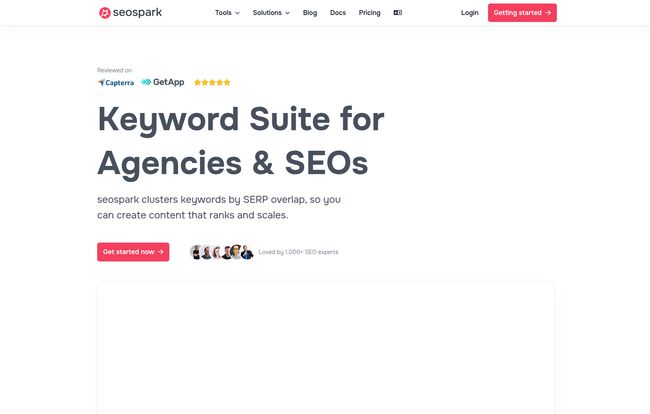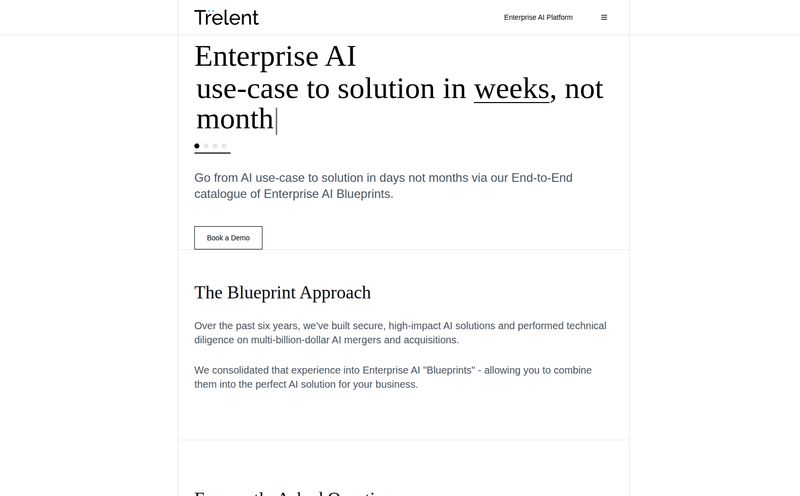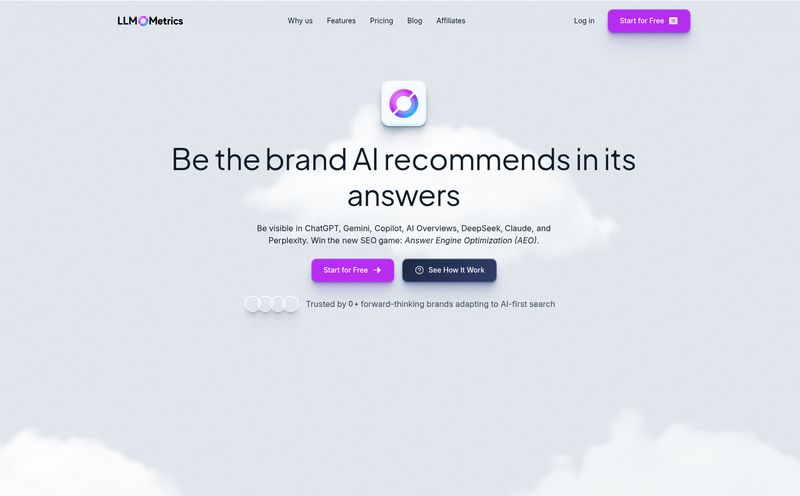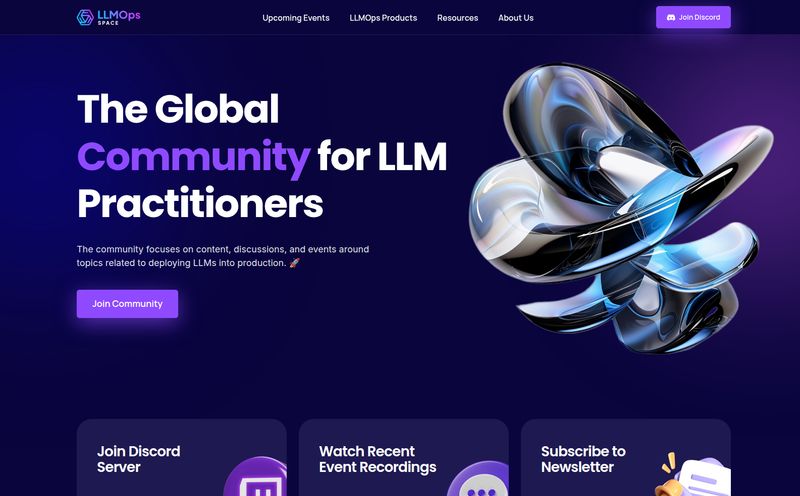We've all been there. Drowning in a sea of spreadsheets, each tab a different keyword export, trying to mentally group thousands of terms into something that vaguely resembles a coherent content plan. It's the less glamorous side of SEO, the digital equivalent of sorting a million tiny screws by thread size. You know it’s important, you know topical authority is king, but man, is it a grind.
For years, I've relied on a messy cocktail of different tools, custom Python scripts, and way too much caffeine to get the job done. So when I started hearing whispers about a tool called SEOspark, I was skeptical but intrigued. It promised to bridge that frustrating gap between raw keyword data and an actionable, scalable content strategy. It even used to be called HyperSuggest, a name some of you old-timers might recognize.
So, I rolled up my sleeves and put it through its paces. This isn't going to be a sterile, feature-list article. This is my real, in-the-trenches take on whether SEOspark is just another shiny object or a genuinely useful weapon in the modern SEO's arsenal.
What Exactly is SEOspark and Who Is It For?
At its core, SEOspark is a keyword research and content strategy platform. But that's like calling a Leatherman a knife. It does a lot more. Instead of just giving you a list of keywords, it's designed to help you understand how those keywords fit together to build a powerful website structure. It's for the doers, the people actually in the weeds building out content hubs and service pages.
The platform seems to have three specific people in mind:
- Agencies: Juggling multiple clients, each with different content needs? The goal here is to streamline that chaotic process and deliver consistent results without burning out your team.
- Freelancers: You’re the chief cook and bottle washer. You need tools that punch above their weight, giving you agency-level insights without the soul-crushing agency-level price tag.
- Shop Owners: Whether you're on Shopify or WooCommerce, you know content drives traffic. SEOspark aims to help you find those untapped informational keywords that bring in buyers, not just browsers.
Think of it this way: many keyword tools are like giving you a shovel and pointing at a field. SEOspark tries to be the geological survey map that shows you exactly where the gold veins are, how deep they run, and how they connect to each other. It’s a subtle but massive difference in approach.

Visit seospark.io
#
The Core Features That Made Me Look Twice
Okay, let's get into the good stuff. What does it actually do that makes it stand out from the crowd? A few features really caught my eye.
The Magic of SERP-Based Keyword Clustering
This, for me, is the main event. The absolute killer feature. For years, keyword clustering tools have grouped terms based on semantics—words that sound like they belong together. "Dog food," "puppy chow," "kibble." Makes sense, right? Kinda.
But SEOspark does it differently. It clusters keywords based on SERP overlap. In simple terms, it looks at two keywords, checks the top 10 results on Google for both, and if they share a significant number of the same ranking pages, it groups them. Why is this so much better? Because it’s not guessing at intent; it's using Google's own data to see what the search engine already considers to be part of the same conversation. This is how you build pages that can rank for dozens, sometimes hundreds, of related terms. It’s no longer about one page, one keyword. This is how you build topical authority that Google rewards. It's a game-changer and it saved me hours of manual cross-referencing on teh first try.
#
From Keywords to Content Briefs in a Snap
So you have your beautiful, logically-sound keyword clusters. Now what? This is usually where the process breaks down and gets handed off to a writer with a vague set of instructions. SEOspark tries to fix that with its integrated AI Content Briefings.
It can automatically generate outlines, suggest headings, and even create first drafts based on the keyword cluster and SERP analysis. Now, am I saying you should just copy-paste this and hit publish? Absolutely not. But as a starting point? It's fantastic. It gives your writers a solid, data-informed foundation to build upon, ensuring they cover all the necessary subtopics. For an agency managing a team of writers, this feature alone could be worth the price of admission by ensuring consistency and quality at scale.
More Than Just Keywords - Digging for Questions
I'm a sucker for "People Also Asked" (PAA) data. It's a direct line into the minds of your audience. SEOspark has a dedicated tool for pulling these questions, which is invaluable for a few reasons. First, it's perfect for building out FAQ sections on your pages (like the one at the end of this article!). Second, it helps you create the most comprehensive piece of content on a topic, answering every possible user query. And third, it’s a golden ticket for trying to win those coveted Featured Snippets and Rich Results. It's a simple feature, but one I find myself using constantly.
My Experience: The Good, The Bad, and The "Hmm..."
No tool is perfect, and a review isn't honest if it doesn't cover the full picture. After spending some quality time with SEOspark, here's my breakdown.
On the positive side, the testimonials aren't lying when they say it's reliable and affordable. It feels like a workhorse tool. It does what it says on the tin without a lot of unnecessary fluff or a buggy interface. The support for nearly every language and country is also a massive plus for those of us working on international SEO campaigns. And the whole end-to-end workflow, from research to clustering to briefing, is surprisingly smooth. It feels thoughtfully designed by people who have actually done this work before.
However, there are a couple of things to be aware of. The biggest one for me is their refund policy. As stated in their FAQ, they generally don't accommodate refund requests after onboarding. This isn't necessarily a red flag, but it does mean you need to be pretty sure before you commit, especially to an annual plan. It's a 'measure twice, cut once' situation. Also, as with most SaaS platforms, some features are limited depending on your subscription plan. You'll get more horsepower—more projects, more credits, more users—with the pricier Agency plan, which is to be expected.
#
Let's Talk Money: SEOspark Pricing Breakdown
So, what's this going to cost you? The pricing structure is refreshingly straightforward. They're clearly targeting two distinct user groups.
| Plan | Price | Best For | Key Details |
|---|---|---|---|
| Professional | $69/mo or $49/mo (paid annually) | Freelance SEOs & Consultants | 1 User, 5 Projects, 20,000 Credits |
| Agency | $299/mo or $189/mo (paid annually) | Agencies & In-house Teams | 10 Users, 50 Projects, 100,000 Credits |
My take on the value? For a solo freelancer, that Professional plan at $49 a month (if you go annual) is a fantastic deal. Think about it: how many hours of tedious spreadsheet work would that save you each month? If it saves you even two or three hours, it's already paid for itself. The ROI is pretty clear. For agencies, the value is in scalability and process. The ability to manage 50 projects and have 10 users on the platform can bring some much-needed order to content chaos.
SEOspark vs. The Usual Suspects
Inevitably, you're going to ask: "How does this stack up against Semrush or Ahrefs?" It's a fair question, but they're different beasts. The big all-in-one suites are incredible, but they're also complex and expensive. They're the entire toolbox. SEOspark is more like a specialized, high-powered torque wrench. It's not trying to do everything—it's trying to do keyword clustering and content workflow exceptionally well. If your primary bottleneck is content strategy and creation, SEOspark is a more focused and affordable solution than the giants of the industry.
#
The Final Verdict: Is SEOspark Worth Your Time and Money?
So, where do I land on this? I'm genuinely impressed. In a market saturated with me-too tools, SEOspark has carved out a very specific and very valuable niche.
Who should definitely check it out?
- Freelance SEOs and Content Strategists who are tired of manual SERP analysis and want to deliver more sophisticated content plans to their clients.
- Content Managers at Agencies who need to build a scalable, repeatable process for creating high-quality, SEO-driven content.
- In-house SEOs for e-commerce or SaaS who are tasked with building out large content hubs to establish topical authority.
Who might want to pass?
- Hobby bloggers who are just starting out. The price point might be a bit steep if you're not monetizing your site yet.
- SEOs who primarily need backlink analysis or technical site auditing. This isn't an all-in-one suite, it's a content specialist.
For me, SEOspark feels like a tool built by people who understand the real pain points of content-focused SEO. It's not just about data; it's about turning that data into a coherent, actionable plan. It's a powerful bridge between research and execution, and for that reason, it's earned a spot in my personal toolkit.
Frequently Asked Questions
How can I get access to seospark.io?
You can sign up directly on their website, seospark.io. They have a straightforward registration process where you can choose between their Professional and Agency plans.
How many keywords can I cluster at once?
The exact number depends on your plan and available credits. The tool is designed to handle large lists, often thousands of keywords, to build comprehensive topic clusters for your content strategy.
Does seospark support all languages and countries?
One of its biggest strengths is its broad support. It works for nearly every language and country that has a Google presence, making it an excellent choice for international SEO campaigns.
Can I organize my research in projects?
Yes, absolutely. The platform is built around a project-based workflow. This is perfect for agencies and freelancers managing multiple clients or websites, as it keeps all your research, clusters, and briefs neatly organized.
What is the refund policy?
This is an important one. According to their site, they generally do not offer refunds after you've gone through the onboarding process. It's best to be sure about your choice before making a purchase, especially an annual one.
Is SEOspark good for beginners?
I'd say it's more for intermediate to advanced users. While the interface is clean, the concepts it's built on—like SERP-based clustering and topical authority—are more powerful in the hands of someone who already understands the fundamentals of SEO content strategy.
A Final Thought
Choosing the right tools is less about finding a magic bullet and more about building an efficient system. SEOspark isn't magic, but it's an incredibly efficient system for one of the most time-consuming parts of our job. It helps turn the chaotic art of content planning into a data-driven science, and in this competitive field, that's a powerful advantage.
Reference and Sources
- SEOspark Homepage: https://www.seospark.io/
- SEOspark Pricing Page: https://www.seospark.io/pricing/



